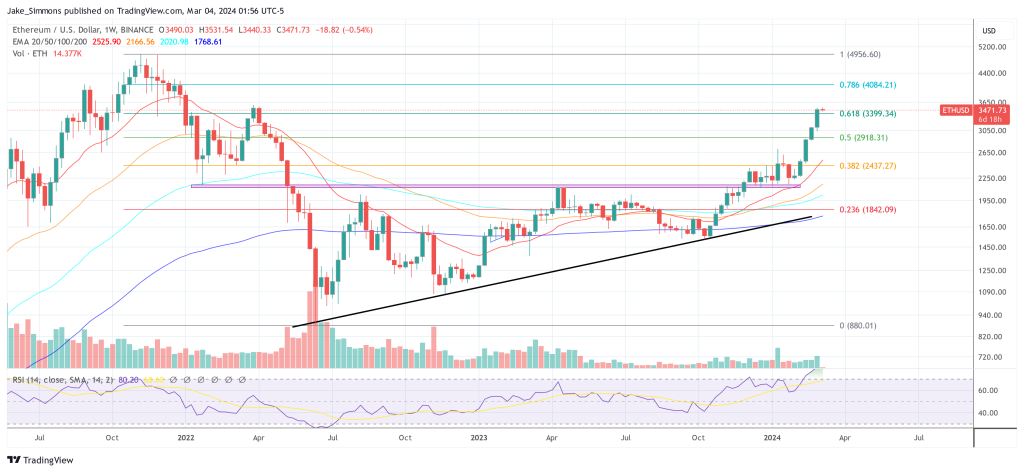In a series of provocative posts on X (formerly Twitter), Ethereum co-founder Steven Nerayoff has teased what he describes as “the revelation of a lifetime,” hinting at seismic disclosures that could reshape the public’s understanding of ETH, its foundation, and the broader crypto landscape. Nerayoff’s statements, coupled with remarks from on-chain researcher TruthLabs (@BoringSleuth), suggest an impending release of information alleging widespread corruption linked to the Ethereum Foundation and its co-founders.
Ethereum Insider: “The Time Has Come”
Nerayoff, in a tantalizing announcement, promised a disclosure that would “change our lives” and “our perspective on the world,” implicating the Ethereum Foundation in what he suggests are significant and previously undisclosed illicit activities.
“READY FOR THE REVELATION OF A LIFETIME? The time has come! The truth has been revealed and it is not what we expected when we first embarked on this journey,” Nerayoff posted, elevating expectations and setting the stage for a major exposé. He hailed @BoringSleuth as a pivotal figure in uncovering what he describes as “massive corruption” tied to the Ethereum Foundation.
@BoringSleuth’s own comments added depth to the intrigue, stating, “I came across some information this week that was passed on to me, and I’ve now verified it. Within it, ties together so much of what is Broken in my Country, and most likely, the rest of the World.” This statement not only underscores the gravity of the findings but also hints at a systemic issue transcending national borders, rooted in blockchain’s transparency and immutable record-keeping capabilities.
Nerayoff further stirred the pot with allegations directly targeting the operations and ethical standing of the ETH Foundation. “The recent revelations surrounding the Ethereum Foundation and their alleged involvement in illicit activities are irrefutable and unbelievable,” he claimed, expressing frustration over the lack of wider media and governmental traction for these issues.
He drew parallels between the forthcoming disclosures and historical financial scandals, stating, “Just like SBF and Madoff, the truth will eventually come out, no matter how hard they try to hide it.” This comparison not only magnifies the anticipated impact of the revelations but also aligns them with some of the most consequential financial truth-tellings in recent history.
What “Went Wrong” With Ethereum
Nerayoff’s critique extends deeply into the operational shifts within Ethereum since its inception. In another post on X, he criticized the platform’s evolution away from its founding principles, as evidenced by a decade-old video of Vitalik Buterin, which he claims shows a stark contrast to current practices. “This 10-year-old video of Vitalik Buterin showcases a significant contrast between his early assertions about ETH and its current state,” Nerayoff remarked.
Firstly, Nerayoff addresses the contentious issue of on-chain data deletion. He asserts this practice is in direct contradiction to Ethereum’s decentralization ethos, suggesting it serves to obscure the ETH Foundation’s involvement in past controversies, including significant security breaches like the DAO and Gatecoin hacks.
Nerayoff also raises alarms over the increasing transaction fees on Ethereum, which cast doubt on the blockchain’s sustainability and accessibility. He suggests these rising costs disproportionately benefit a small group of individuals, undermining the egalitarian premise of the blockchain.
Furthermore, Nerayoff critiques the lack of transformative decentralized applications (DApps), which were anticipated to be life-changing. He implies that the initial vision for Ethereum’s utility and impact has been sidelined, with the platform’s development and evolution seemingly prioritizing interests that do not align with those of the broader Ethereum community.
Another significant point of contention is the pre-mine controversy. Nerayoff highlights discrepancies in the initially promised minimal pre-mine volume, asserting that a larger than disclosed amount was acquired by a select few, including entities associated with the Chinese Communist Party (CCP). This, he argues, has led to trust issues within the Ethereum community and questions the platform’s commitment to decentralization.
Lastly, Nerayoff reiterates his stance on the fundamental nature of Ethereum as merely an open-source database, challenging the platform’s decentralized label. He points to the lack of response from Ethereum’s leadership to his criticisms as tacit acknowledgment of the issues he raises, particularly noting Vitalik Buterin’s choice of residence in a non-extradition country as indicative of the seriousness of these concerns.
Nerayoff’s bold claims culminate in a stark warning: “With all this evidence piling up and no answers in sight, it makes you think: At what point does this house of cards collapse? What does the future of Ethereum and crypto have in store for us?”
At press time, ETH traded at $3,471.












